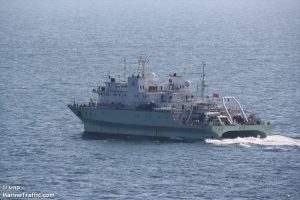The Chinese Ministry of Foreign Affairs has announced that Chinese research vessels must attempt to secure permission before conducting research activities in the exclusive economic zones (EEZ) of other countries. The announcement follows the expulsion of a Chinese research vessel by the Indian Navy recently from India’s EEZ. The new guidance applies only to marine scientific research.
“Institutions or individuals … must comply with the United Nations Convention on the Law of the Sea (UNCLOS), obey the law of the country, follow the research programme approved by the coastal state, and shall not conduct scientific research in the waters under foreign administration without making application or without the application being approved,” the official Chinese notice said, according to the South China Morning Post.
Admiral Karambir Singh, chief of the Indian Navy, said that India’s “stance has been that if you do anything in our region, you have to notify us or get our permission.” Singh was discussing the expulsion of the Shi Yan 1 by the Indian Navy recently in the Andaman Sea, off the Andaman and Nicobar Islands.
The guidance suggests a greater intention by China to comply with UNCLOS, where Article 248 stipulates that “States and competent international organizations which intend to undertake marine scientific research in the exclusive economic zone or on the continental shelf of a coastal State shall, not less than six months in advance of the expected starting date of the marine scientific research project.”
However, it’s unclear how Chinese marine scientific research vessels may choose to proceed in cases where coastal states (like India) fail to respond to a request for permission within six months. Article 252 of UNCLOS, which both India and China have signed and ratified, provides for an “implied consent” provision, where, six months after notification, states are entitled to proceed with marine research activity without explicit consent from a coastal state.
Both India and China are sensitive to other countries conducting military surveillance activities inside their EEZs. The United States, however, maintains that surveillance activities are valid under customary international law. (Washington has yet to ratify UNCLOS).
According to UNCLOS, a coastal state’s exclusive economic zone extends for 200 nautical miles off its territorial sea baselines. Coastal states maintain exclusive rights to explore and exploit natural resources in the area, which is partly why certain kinds of marine scientific research can be prohibited.
It’s unclear if China will apply its recent guidance in disputed waters in the South China Sea. Earlier this year, a Chinese maritime survey ship, Haiyang Dizhi 8, conducted extensive surveys of disputed oil blocks in waters claimed by Vietnam as part of its EEZ. Beijing claims nearly the entirety of the South China Sea under its capacious nine-dash line claim.

































